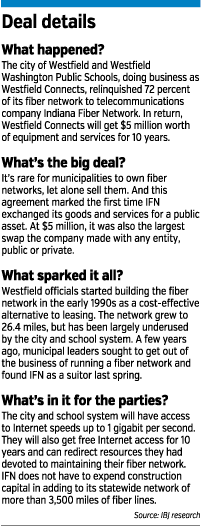Subscriber Benefit
As a subscriber you can listen to articles at work, in the car, or while you work out. Subscribe NowIt’s rare for a city to own a fiber network. It’s even rarer for a city to sell one in a multimillion-dollar deal.
That’s what happened in Westfield, as the city and its school district recently exchanged their homegrown network for $5 million in in-kind services. The suitor was the Indiana Fiber Network and, as a result of the agreement, city and school officials will not have to worry about things like paying for Internet service for the next 10 years.
 Dyer
DyerThe transaction was completed Dec. 30, marking the end of a 20-year era in which the city managed miles of cables known for their superior ability to transmit digital data. Fewer than 20 out of several hundred Indiana municipalities own a fiber network, IFN President and CEO Kelly Dyer said, but Westfield was able to exit the business and lock in services and equipment worth nearly four times the book value of its network.
“This is the only deal that I know of in the last 10 years of this magnitude where a city got into it, decided to get out of it, and actually completed the deal,” Dyer said.
The city of Westfield and Westfield Washington Schools, which operate the network under the name Westfield Connects, will get free Internet service from IFN with speeds up to 1 gigabit per second. That’s about 10 times faster than what’s common for most public and private enterprises.
It will also see new equipment that will enhance its intranet, or internal network, and get free network support for 10 years.
IFN, an Indianapolis-based telecommunications company, will add 26.4 miles of fiber to its 3,500-plus-mile statewide fiber network. Westfield Connects will still own 28 percent of the fiber lines, but its executive director, John Rogers, said it was time to hand over the management reins to the private sector.
 Rogers
Rogers“Let’s be clear: The city is not in the telecom business,” said Rogers, who spearheaded the divestment.
The deal has similarities to other agreements where entities with taxing power have sold or planned to sell public assets. Late last year, for instance, Hamilton Southeastern Schools agreed to sell three parcels of land for $2.4 million in much-needed cash.
Jeff Qualkinbush, a Barnes & Thornburg LLP partner who specializes in government finance, said because of property tax caps and other budget issues, school corporations in Indiana “are looking for ways to generate revenues that are new and non-conventional.”
While the Westfield Connects-IFN deal is unconventional, it wasn’t driven by financial need, officials said. In fact, the city actually brought in $35,000 more annually than it spent on contracts to maintain the network, according to recent city data, as a few Internet service providers paid the city to lease the fiber lines.

Rogers, who is also the city’s director of enterprise development, said the aim was to shift the burden of running a fiber network to the public sector. Previously a manager at Duke Realty Corp., Rogers was hired by the city in 2008 to help reorganize the public works department. The department was in charge of the fiber network, which Rogers said was so large that the city and school system would probably never need its full capacity.
“This goes back to the leadership of Mayor [Andy] Cook and value,” Rogers said. “We’re trying to find value. And when you’re constantly looking for value, for me I honed in on a particular asset that was undervalued.”
The following year, Rogers helped create Westfield Connects, which went on to hash out deals with Internet service providers looking to access Westfield commercial customers via fiber. Under those agreements, the private companies expanded the fiber network, passed ownership to the public sector, then leased the lines. Under Rogers’ watch, the fiber network grew from about 17 miles to more than 26 miles.
The goal was to grow the network to make it attractive to a buyer, and Westfield Connects put out requests for proposals in 2012 and 2013. A handful of companies bit in 2013, and IFN won out in early 2014 with its services and equipment offer.
The city embarked on building its own fiber network around 1993, Rogers said, likely as a cost-effective alternative to leasing fiber infrastructure aimed at boosting economic development. The high costs to rent fiber lines probably justified owning back then, Dyer said, but leasing costs now are substantially lower.
After 20 years and an estimated $2 million spent on building and maintaining the network, the city and its school system don’t have to spend a dime to lease a fiber network connection—at least not for 10 years.•
Please enable JavaScript to view this content.
